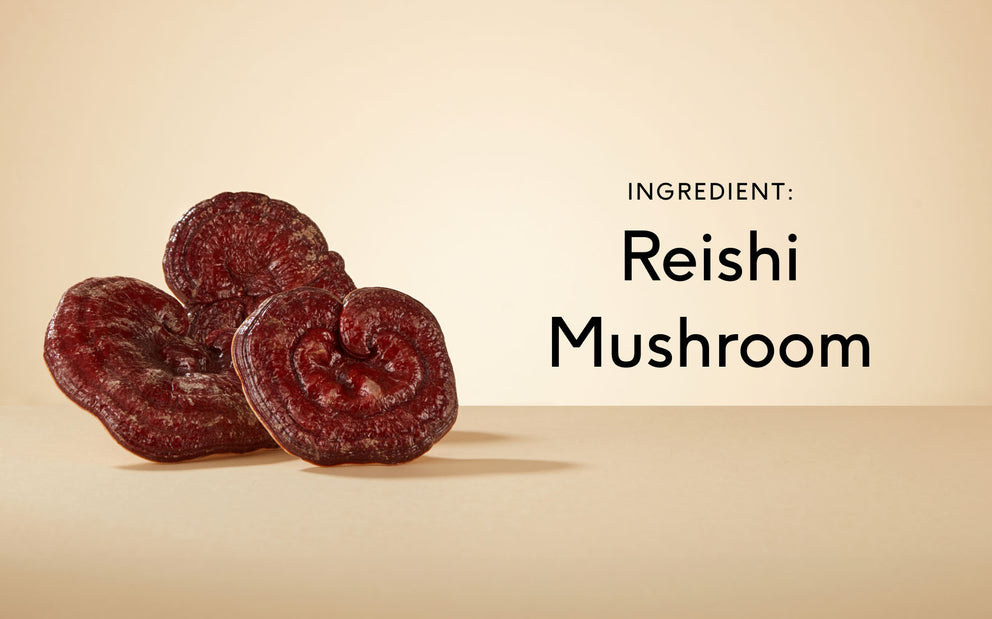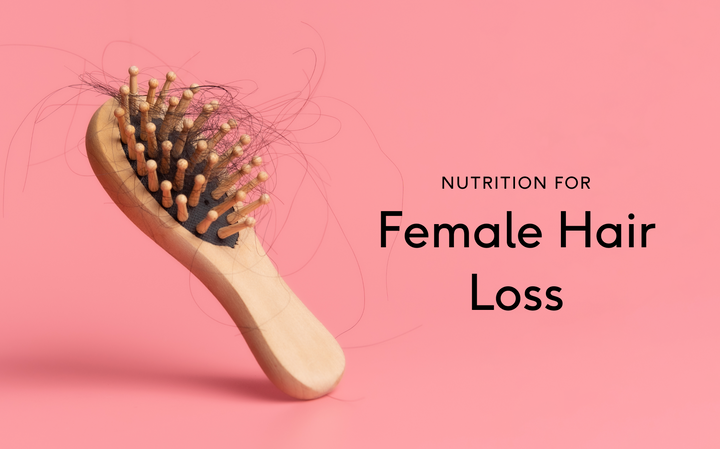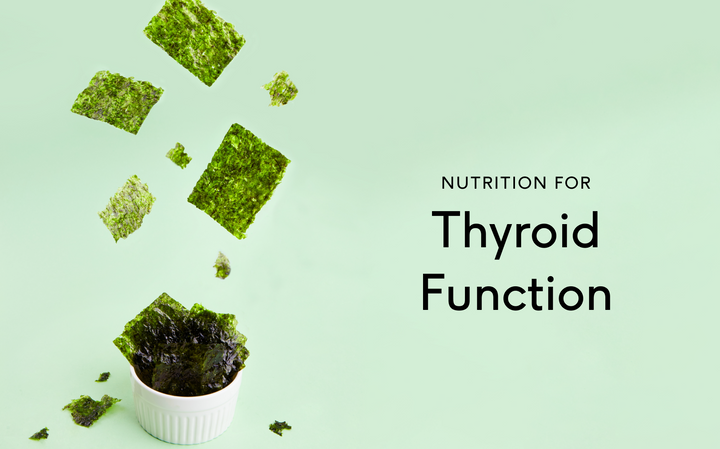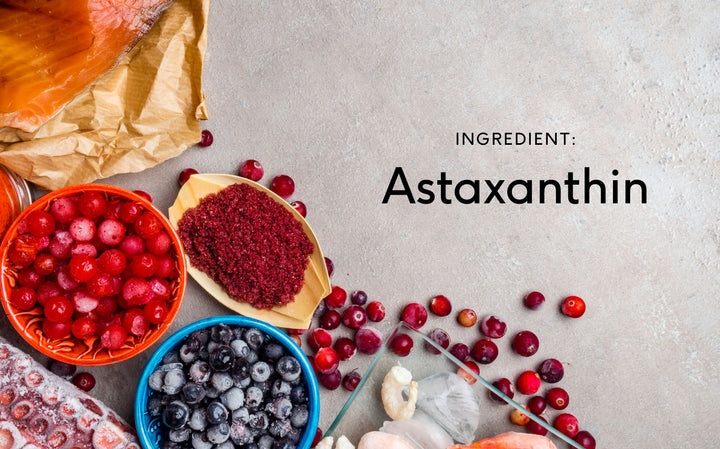What is Reishi Mushrooms: Benefits, Risks, How to use [2025 Nutritionist Reviewed]
Maya has completed an MSc in Advanced Complementary Medicine and specialises in the management of metabolic syndrome, NAFLD, cardiovascular and other chronic conditions.
Maya has completed an MSc in Advanced Complementary Medicine and specialises in the management of metabolic syndrome, NAFLD, cardiovascular and other chronic conditions.
Table of contents

| Ingredient name |
Reishi mushroom, commonly referred to in Japan by this name |
| The ingredient is also known as | Ganoderma lucidum or Lingzhi mushroom in China or “mushroom of immortality" |
| Available Reishi Mushrooms forms |
|
| Possible bioavailability | It depends on the form it is consumed and individual factors such as age and health status. Some forms of reishi mushrooms, such as powders and capsules may be better absorbed and metabolised by the body than others, such as whole dried mushrooms |
| Water-soluble or fat-soluble | Reishi mushrooms contain both water-soluble and fat-soluble compounds. The water-soluble compounds include beta-glucans and peptides, while the fat-soluble compounds include triterpenes and ganoderic acids1.The different forms of reishi mushrooms can affect the solubility of these compounds, and some forms may be more effective |
| Believed health benefits associated with Reishi Mushrooms |
|
| Year ingredient discovered | Reishi mushrooms are rooted in traditional Asian medicine dating back 2000+ years |
| Reishi Mushrooms mostly used in |
Ganoderma lucidum has a long history of use in traditional Chinese and Japanese medicine for various health conditions, including liver disease, chronic hepatitis, kidney disease, high blood pressure, arthritis, fatigue, insomnia, bronchitis, asthma and stomach ulcers.2 |
| Recommended dose |
This ingredient is not a recognised essential vitamin or mineral, so there is no recommended dosage. However, some studies have used 1.44 grams of reishi extract per day, equivalent to 13.2 grams of fresh mushroom, as a general guideline.3 Other recommended dosage amounts vary between 1.5-9 grams of dried extract per day.4 |
| Daily reference intake | N/A. There is no established reference intake for Ganoderma lucidum since it is not an essential nutrient the body needs to function correctly. |
| How long does Reishi Mushroom take to work? | Everyone is different with regards to Reishi absorption. There have been reports of feeling a difference within a hour of using Reishi mushroom capsules, but for most, it may take a few weeks of daily intake. By 3 months you will certainly notice the benefits. |
| Does the human body produce this ingredient |
No, the human body does not produce reishi mushrooms. Ganoderma lucidum is a type of fungus that grows on dead or dying trees which have been cultivated. Therefore, they must be obtained through dietary intake or supplementation. |
|
The half-life of Reishi Mushrooms |
This depends on the specific compounds present and their metabolism. Some of the compounds present in reishi mushrooms are fat-soluble, meaning they accumulate in the body and may take longer to be expelled than the water-soluble components, which can leave the body relatively quickly |
| Signs of Reishi Mushrooms deficiency |
N/A. Reishi mushroom is not classed as a vitamin or mineral that the body requires to function; therefore, it is impossible to have a deficiency |
1. What is Reishi Mushrooms?
Reishi mushrooms, also known as Ganoderma lucidum, are adaptogenic mushrooms with a long history of use in traditional Chinese medicine for their various health benefits.5 They are often referred to as the “mushrooms of immortality” due to their ability to promote longevity and wellness.
2. What forms of Reishi Mushrooms are there?
Numerous forms of Ganoderma lucidum are available, prepared from different parts of the mushroom.
Reishi mushrooms can come in many available forms, such as:
- Raw, cooked
- Whole dried
- Powdered in a capsule
- Extract
- Tea or coffee
However, the whole mushroom is known to have a bitter taste and is hard to come by, so most people may wish to take them in supplement form.

3. What is Reishi Mushrooms made from?
Ganoderma lucidum is a type of fungus that grows on decaying trees.6 The fruiting bodies, mycelia and spores are mainly used to produce extracts, tea, powders and supplements.7
4. What do Reishi Mushrooms do?
Reishi mushroom is a herbal medicine traditionally used in Asia for its health benefits. Research has demonstrated that G. lucidum contains 400 bioactive compounds, mostly triterpenes and polysaccharides, that have anti-inflammatory, anti-tumour, immunomodulatory and anti-microbial effects.6
5. What is the function of Reishi Mushrooms supplements?
Reishi mushroom supplements are used for the health benefits of reishi mushrooms, such as supporting the immune system,8 lowering blood sugar levels 9 and cardiovascular health.10
6. What is Reishi Mushrooms used for?
Lingzhi is one of the most well-known and highly revered mushrooms in eastern countries like China, Japan, and Korea proposed to have health benefits and is used traditionally to promote longevity and general health.2
7. Is Reishi Mushrooms effective?
The effectiveness of the reishi mushroom is still being researched and is not fully understood. Some human and animal models studies have suggested that the compounds obtained from reishi mushroom fruiting bodies, cultured mycelium and culture filtrates may have potential health benefits such as for immune support, fatigue, metabolic syndrome, atherosclerosis and more, both in vivo and in vitro.11 However, more rigorous clinical trials may be needed to confirm these findings.
8. How to take Reishi Mushrooms?
Reishi mushroom doesn’t need to be taken with food; therefore, it can be taken at any time of day; the choice is up to you. That being said, consistency is key to reaping the full benefits.
Reishi mushrooms can be taken in a variety of formats, including:
- Capsules or tablets are a convenient and standard way to consume Lingzhi.
- A mushroom powder can be added to smoothies, teas and soups
- Liquid extract is a concentrated form of reishi mushroom that is taken as a tincture or added to other liquids.
- Whole dried mushrooms can be steeped in hot water to make tea or used in cooking.
9. How long does it take for Reishi Mushrooms to work?
The amount of time it takes for reishi mushroom to work depends on the form it’s taken, the health status of the individual and the reason for taking it, i.e. to treat a health condition. The main components of reishi mushrooms, such as ganoderic acid and the triterpenoid extract present in the reishi mushroom, can be rapidly absorbed in the gastrointestinal tract after oral consumption.12 The fat-soluble nature of ganoderic acid also enables it to accumulate in the body and be stored for later use.
The main components of mushroom polysaccharides, the non-digestible and prebiotic beta-glucans, can reach the large intestine and positively modulate the gut microbiome.13 Human health is closely tied to the balance of bacteria in the gut; therefore, continuous long-term intake of prebiotics from the fibre is needed to achieve these benefits.14
The bottom line is that consistency is key to achieving the full benefits of reishi mushrooms.
10. How long does it take for your body to absorb Reishi Mushrooms?
Since Reishi mushroom is a food, it is absorbed in the body similarly to other foods. That being said, the time it takes for reishi mushrooms to work depends on several factors, including the form and the dose of reishi mushrooms consumed, such as supplements, individual differences in absorption and metabolism, and the presence of other compounds in the body.
The compounds like ganoderic acid are readily absorbed in the gastrointestinal tract after oral administration. The beta-glucans are also absorbed in the intestine,15 where they begin to exert their effects on the microbiome.
11. The health benefits of Reishi Mushrooms
In the last 30 years, western science has been increasingly studying these mushrooms to discover their health benefits. Most of the research points to the compounds like triterpenes and polysaccharides providing benefits on cardiovascular health, the immune system, anti-cancer and anti-tumour, diabetes and inflammation.

Health benefit 1- Cardiovascular health
Reishi mushroom has a long history of being used for cardiovascular health in Asia. Its active compounds, such as polysaccharides and triterpenoids, have antioxidant effects, which protect against oxidative stress and plaque formation in blood vessels.10
- In a study of people with high blood pressure or cholesterol levels, a reishi supplement containing 1.44 grams decreased triglycerides (fat molecule) and increased HDL (good) cholesterol compared to a placebo.16
- Other clinical trials have also shown that reishi supplementation can lead to a slight decrease in total cholesterol, LDL (bad) cholesterol, and triglycerides after just 4 weeks.3
Health benefit 2 - Immune system modulation
The reishi mushroom has been shown to have immune-modulating effects thanks to its polysaccharides. Meaning it can help regulate and improve the function of the immune system.
- In laboratory and real-life studies, polysaccharides have been shown to enhance immune function.17
- One study observed an improvement in immune response in advanced cancer patients who took a polysaccharide extract from reishi mushrooms.18 The same effect was noted in advanced colorectal cancer patients.19
Health benefit 3 - Cancer
Medicinal mushrooms like reishi mushrooms have been proposed as a promising adjunctive therapy for cancer treatment and to enhance the immune response to the disease.20 Reishi mushrooms contain active compounds called triterpenoids, which have been found to have toxic effects on cancer cells.
In particular, ganoderic acid T has shown efficacy in both vitro and in vivo studies by hindering the growth and replication of cancer cells, leading to cell death.21
The triterpenoids found in reishi mushrooms have also been shown to have anti-cancer properties, particularly in breast cancer, presenting them as a potential prevention strategy.22
Studies have also shown that reishi mushrooms can prevent cancer cell adhesion and movement in prostate cancer.23 Furthermore, the anti-tumour effects of beta-glucans found in reishi mushrooms have been shown to boost the immune response, resulting in the activation of natural killer cells, T cells and B cells, indirectly preventing cancer growth and spread.24
Health benefit 4 - Diabetes
The consumption of reishi mushrooms has been linked to blood sugar regulation in animal and human studies.
The ganoderans A and B from Lingzhi were found to decrease blood sugar concentrations by up to 50% in animal models.5
A 12-week clinical trial also supported these findings in humans, as patients taking a reishi mushroom extract (Ganopoly) experienced a significant decrease in average, fasting and post-meal blood sugar levels. At the same time, the placebo group did not show these improvements.25
Additionally, reishi polysaccharides have shown potential in aiding diabetic wound healing in animal models compared to placebo and control groups.26
Health benefit 5 - Inflammation
Reishi mushroom has been found to possess anti-inflammatory properties, as demonstrated by a study which reported reishi prevents the release of pro-inflammatory compounds, interleukin-6 (IL-6) and interleukin-8 (IL-8). 27 Another study revealed that the polysaccharides in reishi could block leukocyte and cytokine inflammation,28 proving further evidence of its anti-inflammatory effects.
12. How much Reishi Mushrooms do I need to take to feel the benefits?
The amount of reishi mushroom one would need to feel the benefits depends on what you are taking it for. The typical dose in dried mushrooms ranges from 1.5-9 grams, 1-1.5 grams of reishi powder or 1 ml of reishi tincture.29 Generally, with dried extract and capsules, the dosage required is low as it is a concentrated amount.
13. What are the side effects of Reishi Mushrooms?
Reishi mushroom supplements can cause unwanted side effects such as dry mouth, dizziness, stomach upset and skin changes such as itching.30 These side effects tend to be mild and short-lived. Still, some people may experience an allergic reaction or an interaction with a pre-existing medical condition. It is important to consult a healthcare professional before taking new supplements to ensure safety.
- In some rare cases, liver damage has been previously reported with reishi mushroom supplementation.31
- Studies have not looked at the effect of Reishi mushroom in pregnant or breastfeeding women, so it is advised to speak to a healthcare professional and seek medical advice
14. What are the signs of Reishi Mushrooms deficiency?
Unlike other recognised vitamins and minerals, the body does not require reishi mushrooms for normal functioning. However, missing out on this adaptogen may mean missing out on potential health benefits.
15. What are the risks associated and warnings with taking Reishi Mushrooms?
- No studies have confirmed the safety of reishi mushroom supplements during pregnancy and breastfeeding.
- Reishi mushroom is not recommended for those taking medications to suppress the immune system, as reishi is known to enhance the immune system.2
- Reishi mushrooms have been found to have an anti-coagulant effect and may increase the risk of bleeding in people with bleeding disorders.30
- Reishi mushrooms are also not recommended for people with low blood pressure.

16. What is a good Reishi Mushrooms supplement?
A study assessed the quality of reishi mushroom supplements and found that only 26.3% accurately matched the claimed ingredients that provide the advertised health benefits, suggesting many supplements on the market may be of low quality.32 It is best to choose a high-quality reishi mushroom supplement from a reputable source, made from pure mushroom extract, with a standardised dosage. Or you can include it as part of a multivitamin supplement as we have done at Feel with reishi mushroom extract ranging from 25-30mg included in our Feel Multivitamin supplement and in our Feel Immunity supplement.
17. Where can I buy Reishi Mushrooms?
Reishi mushroom supplements can be purchased at various health food stores or online from supplement companies like Feel. It is important to research and choose a reputable source before buying a reishi mushroom supplement like you would when taking any other dietary supplement.
18. Interactions and contraindications when taking Reishi Mushrooms?
Reishi mushroom may interact with certain medications, such as diabetes medications and medications that lower blood pressure33. Also, one study found that reishi mushroom reduces blood clotting7 ,which may cause adverse effects in people taking medications such as warfarin (to prevent blood clots), resulting in an increased risk of bleeding or bruising34. It is important to speak to your healthcare provider if you take any pre-existing medication before deciding whether reishi mushroom supplements are right for you.
References
[1] https://learn.freshcap.com/tips/reishi-guide/
[2] http://dixonnetworkingassociates.org/files/reishi.pdf
[3] https://www.cambridge.org/core/services/aop-cambridge-core/content/view/CC461FCEFC25B893402F61174E70E85F/S0007114504000352a.pdf/ganoderma-lucidum-lingzhi-a-chinese-medicinal-mushroom-biomarker-responses-in-a-controlled-human-supplementation-study.pdf
[4] https://www.cochranelibrary.com/cdsr/doi/10.1002/14651858.CD007259.pub2/epdf/full
[5]https://www.ncbi.nlm.nih.gov/books/NBK92757/report=classic#_ch9_sec4_
[6] https://www.frontiersin.org/articles/10.3389/fmicb.2018.01557/full
[7] https://www.mdpi.com/2072-6643/11/12/3040
[8] https://reader.elsevier.com/reader/sd/pii/S1347861319321103?token=4D89117BB9C80DBD09CD256E0CC9A9E8AF1DD28825BCE0C29A59B847CFE581B0616AA1A7AF24772E011EA5311B92CB98&originRegion=eu-west-1&originCreation=20230130180135
[9] https://link.springer.com/article/10.1007/s12272-012-1012-z
[10] https://www.tandfonline.com/doi/epdf/10.1080/13880209.2021.1969413?needAccess=true&role=button
[11] https://www.ncbi.nlm.nih.gov/pmc/articles/PMC3546526/
[12] https://www.sciencedirect.com/science/article/pii/S022352341930354X?casa_token=UC8vmEoAQ_sAAAAA:sR04_aRUS3tVUEwsZ3VAWhZFMRcnGxW1c5fOBMqkqwdCOPD-MkwdD_nSVLFcEcGh1UX9FzMfHQ
[13] https://www.mdpi.com/2304-8158/10/9/2015
[14] https://www.ncbi.nlm.nih.gov/pmc/articles/PMC6463098/
[15] https://www.ncbi.nlm.nih.gov/pmc/articles/PMC3217690/
[16] https://www.cambridge.org/core/journals/british-journal-of-nutrition/article/study-of-potential-cardioprotective-effects-of-ganoderma-lucidum-lingzhi-results-of-a-controlled-human-intervention-trial/EA5C9B682C6C112A0D6D0396E06B96E3
[17] https://www.sciencedirect.com/science/article/pii/S1347861319321103
[18] https://www.tandfonline.com/doi/abs/10.1081/imm-120022979?journalCode=iimm20
[19] https://www.sciencedirect.com/science/article/pii/S1567576905002535?via%3Dihub
[20] https://www.ncbi.nlm.nih.gov/pmc/articles/PMC4684115/pdf/32-44.pdf
[21]https://mb.journals.ekb.eg/article_40239_1dc6f3406f62b074e005c390269d4558.pdf
[22] https://www.imrpress.com/journal/FBL/16/3/10.2741/3730
[23] https://journals.sagepub.com/doi/epdf/10.1177/1534735403259066
[24] https://link.springer.com/article/10.1007/s00253-002-1076-7
[25] https://dl.begellhouse.com/journals/708ae68d64b17c52,0738f8d34e863c74,1629a45749954343.html
[26] https://downloads.hindawi.com/journals/ecam/2013/671252.pdf
[27] https://www.ncbi.nlm.nih.gov/pmc/articles/PMC5372873/pdf/nutrients-09-00210.pdf
[28]https://www.sciencedirect.com/science/article/abs/pii/S0141813017323528?via%3Dihub
[29] https://www.webmd.com/vitamins-and-supplements/reishi-mushroom-uses-and-risks
[30] https://medlineplus.gov/druginfo/natural/905.html#Safety
[31] https://www.journal-of-hepatology.eu/article/S0168-8278(04)00258-2/fulltext
[32] https://www.nature.com/articles/s41598-017-06336-3
[33] https://www.rxlist.com/reishi_mushroom/supplements.htm
[34] https://www.ncbi.nlm.nih.gov/pmc/articles/PMC8409941/




















































 Back
Back





